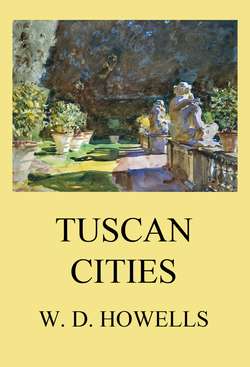Читать книгу Tuscan Cities - William Dean Howells - Страница 11
На сайте Литреса книга снята с продажи.
VIII
ОглавлениеThe sentimentalist is very abundant in Italy, and most commonly he is of our race and religion, though he is rather English than American. The Englishman, so chary of his sensibilities at home, abandons himself to them abroad. At Rome he already regrets the good old days of the temporal power, when the streets were unsafe after nightfall and unclean the whole twenty-four hours, and there was no new quarter. At Venice he is bowed down under the restorations of the Ducal Palace and the church of St Mark; and he has no language in which to speak of the little steamers on the Grand Canal, which the Venetians find so convenient. In Florence, from time to time, he has a panic prescience that they are going to tear down the Ponte Vecchio. I do not know how he gets this, but he has it, and all the rest of us sentimentalists eagerly share it with him when he comes in to the table d'hôte luncheon, puts his Baedeker down by his plate, and before he has had a bite of anything calls out: " Well, they are going to tear down the Ponte Vecchio! "
The first time that this happened in our hotel, I was still under the influence of the climate; but I resolved to visit the Ponte Vecchio with no more delay, lest they should be going to tear it down that afternoon. It was not that I cared a great deal for the bridge itself, but my accumulating impressions of Florentine history had centered about it as the point where that history really began to be historic. I had formed the idea of a little dramatic opening for my sketches there, with Buondelmonte riding in from his villa to meet his bride, and all that spectral train of Ghibelline and Guelphic tragedies behind them on the bridge; and it appeared to me that this could not be managed if the bridge were going to be torn down. I trembled for my cavalcade, ignominiously halted on the other side of the Amo, or obliged to go round and come in on some other bridge without regard to the fact; and at some personal inconvenience I hurried off to the Ponte Vecchio. I could not see that the preparations for its destruction had begun, and I believe they are still threatened only in the imagination of sentimental Anglo-Saxons. The omnibuses were following each other over the bridge in the peaceful succession of so many horsecars to Cambridge, and the ugly little jewelers' booths glittered in their wonted security on either hand all the way across. The carriages, the carts, the foot-passengers were swarming up and down from the thick turmoil of Por San Maria; and the bridge did not respond with the slightest tremor to the heel clandestinely stamped upon it for a final test of its stability.
But the alarm I had suffered was no doubt useful, for it was after this that I really began to be serious with my material, as I found it everywhere in the streets and the books, and located it from one to the other. Even if one has no literary designs upon the facts, that is incomparably the best way of dealing with the past. At home, in the closet, one may read history, but one can realize it, as if it were something personally experienced, only on the spot where it was lived. This seems to me the prime use of travel; and to create the reader a partner in the enterprise and a sharer in its realization seems the sole excuse for books of travel, now when modern facilities have abolished hardship and danger and adventure, and nothing is more likely to happen to one in Florence than in Fitchburg.
In this pursuit of the past, the inquirer will often surprise himself in the possession of a genuine emotion; at moments the illustrious or pathetic figures of other days will seem to walk before him unmocked by the grotesque and burlesquing shadows we all cast while in the flesh. I will not swear it, but it would take little to persuade me that I had vanishing glimpses of many of these figures in Florence. One of the advantages of this method is that you have your historical personages in a sort of picturesque contemporaneity with one another and with yourself, and you imbue them all with the sensibilities of our own time. Perhaps this is not an advantage, but it shows what may be done by the imaginative faculty; and if we do not judge men by ourselves, how are we to judge them at all?
